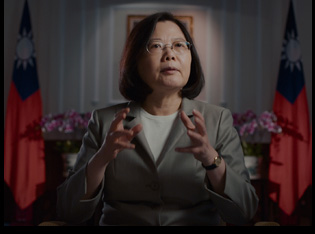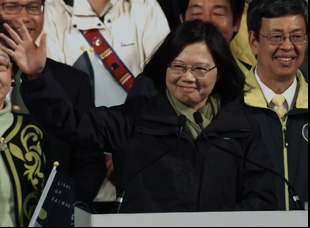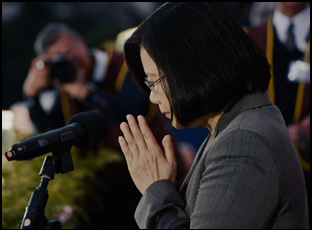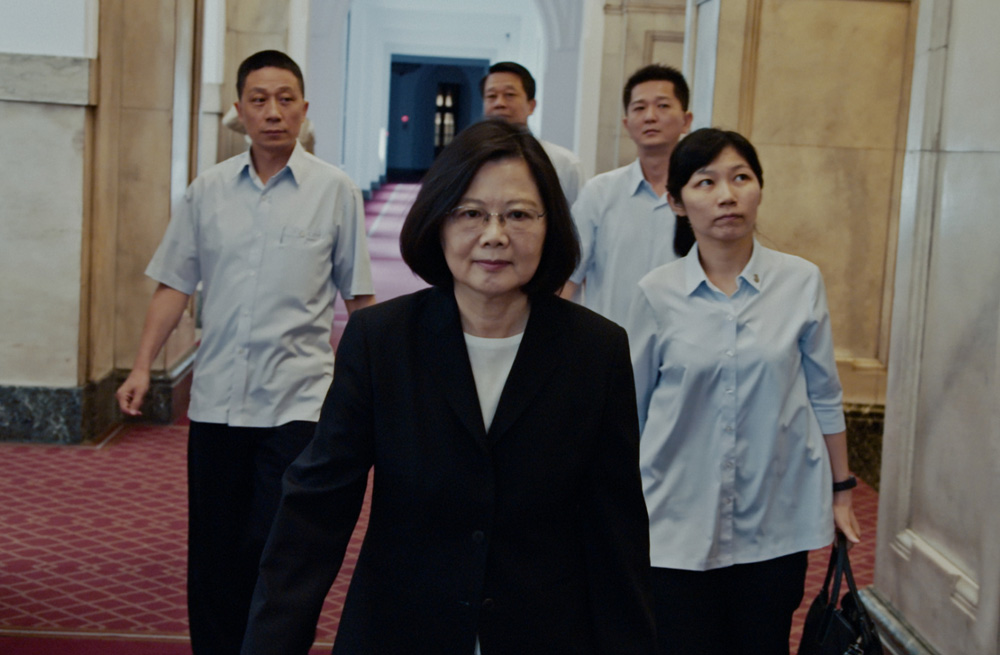Fittingly, one of the highlights of “Invisible Nation” is something only director Vanessa Hope could see as she sat down for an interview with Taiwan President Tsai Ing-wen.
“I worked with a cinematographer named Laura Hudock, who positioned President Tsai for the formal presidential office interview between the flags of Taiwan and I don’t know if you can tell, but President Tsai’s head is blocking the portrait of Chiang Kai-shek, so it’s kind of symbolic, like this is the new leader of the country and that was the old, and she’s in charge,” says Hope, who covered the entirety of the Tsai administration from 2016 to 2024, looking very different from the 25-year reign of Chiang where the country was constrained under martial law. “That was exciting.”
Long before the camera could yield such an insight, Hope had put herself in a unique position to capture history as she watched Tsai as a candidate run a campaign on steadfast in her belief that Taiwan should remain independent from China, which has long looked to claim the country as its own as they have with Hong Kong. It hasn’t been an easy position to take when China has used their leverage as a global economic force to prevent Taiwan from being acknowledged as a country at all by other nations who refer to it as the Republic of China of Taiwan, denied recognition by the United Nations and the World Health Organization and unable to hoist their own flag at the Olympics. After Tsai’s predecessor Ma Ying Jeou was elected on the promise that there would be no reunification on his watch while attempting to strengthen economic ties with mainland China, potentially giving President Xi Jinping more opportunity to pressure the country, Tsai had sought to change attitudes that there needed to be any reliance on their neighbors to the north, instilling confidence that they were a sovereign power.
“Invisible Nation” shows this could hardly happen overnight, nor is the battle to remain independent settled as President Xi has promoted a soft-sounding policy known as “One Country, Two Systems” in which the democracies of Taiwan and Hong Kong would operate under China’s control. But through democracy, Taiwan has asserted its right to its own destiny by electing leaders such as President Tsai and Hope charts the decades-long efforts towards such a tipping point after the country has spent centuries at others’ mercy from its days as a Dutch colony to its uncertain status post-World War II in which Japan relinquished claim to the island, but it did not fall under the Communist rule of the People’s Republic of China that overtook the mainland. With President Tsai’s duties taking her from speaking to elementary school students to observing military preparations, the film takes on the breadth of not only history but a united effort to stand on its own and much like its central subject, brings a number of disparate elements together to make an impact.
With the film now arriving in theaters, Hope spoke about why she was compelled to make a return to Asia after following around former U.S. amabassador Jon Huntsman as he kept up a diplomatic relationship with China in her debut feature “All Eyes and Ears” and getting the remarkable access she did to the Tsai administration, moving between past and present and capturing the seeds of the future even when at some point filming had to end.

In a way, this new one did come about as a kind of extension from the first one [which] follows President Obama’s US ambassador to China and looks at the U.S.-China diplomatic relationship. It really only touches on Taiwan in terms of the United States selling arms to Taiwan, which upsets China and I had a hunch that the people of Taiwan might elect their first female president in January 2016, so I joined a delegation to monitor that the elections were free and fair, so I could be there. I worked with a local film crew and it was so inspiring. We were in the crowd when President Tsai won and I just thought, “Wow, the first time I lived in Taiwan in 1995, that turned out to be the first direct presidential elections in Taiwan’s history [after] their transition to democracy and China was firing missiles at us on the island. So I was drawn in and curious about how this geopolitical predicament happened and what were the U.S. foreign policy fingerprints on it. Then knowing something about the U.S.-China relationship not only helped me get into the Taiwan story and the importance of learning it from the perspective of the people of Taiwan, but it was also a calling card for President Tsai’s team members. People in her office had seen the film and thought, “Vanessa’s been at this and she understands how complicated this story is.”
It deftly balances this broader overview of Taiwanese history with a portrait of President Tsai and as much as those two things are intertwined, I wonder if they’re at odds with each other in putting this together for an 85-minute film.
Probably one of the greatest challenges in making the film was figuring out that balance. I’ve been inspired by Errol Morris. I had a fantasy the very first time I got my first sit-down interview with President Tsai, which I was always granted the tail end of any trip I made to Taiwan, I was so blown away and I just thought we could construct this just like “The Fog of War.” We can have her at the center and the spine would be that one interview and then we can cut away to different things that she’s talking about. I would have happily done that, but in the reality of the major world events unfolding and having access to a first female president over more than one term in office, that started to shape how we could fit President Tsai’s story into the larger narrative. In terms of her personality and her character, that was what she preferred. She’s not a diva, as you can see. She’s a very modest, humble person and sees herself as part of a larger fabric in society and team in the presidential office, building [up] the people that she hires and she didn’t want a biopic. She wanted it to really help people understand the story of Taiwan, the meaning and importance of the country, their democracy, why they matter and why they shouldn’t really remain invisible.

Chen Chu is a politician who began as a democracy and human rights activist who was thrown in jail in 1979 and served seven years in the end, but it was so perilous for her at the time, it looked like she might be in prison for life, so she dedicated her life in her will to the people of Taiwan and I think that really endears her to people in Taiwan, regardless of political parties. She has more of a humble background and that appeals to people and she’s a bridge really between anyone Chinese nationalist KMT party and the Democratic Progressive Party. She’s also a key mentor and ally for President Tsai, [who] brought her into her administration in the first term, and she was one of the most popular mayors of Taiwan of all time and served a long time in that position in Kaohsiung, so she seemed critical. And because of that bridge ability [where] she could appeal to people regardless of political party, her story was a way to [present] the truth and reconciliation with China’s authoritarian past that President Tsai initiated, [which was] was incredible to see [on its own], but Chen Chu returning to the prison where she was held for seven years, which is now a human rights museum, was a big part of that story.
You’re often having to reconcile the present with the past, which is often done with some very shrewdly selected archival material such as the scene of an Olympian crying when there was no Taiwanese flag to be raised upon winning the gold medal, but instead something more generic What was it like for you going back in time?
For every archival moment, we wanted it to tie into something urgent and relevant to the current situation and it was a process to interweave moments of archival that are emotional, as you just described. The Olympics [in particular] are still relevant because the upcoming Olympics in Paris at the end of July, we’ll have a team from Taiwan who are under the name of Chinese Taipei, so for international audiences to understand that once upon a time Taiwan had a seat in the U.N. and was officially diplomatically recognized by the major countries so it could compete as Taiwan, seems really significant for improving the situation for Taiwan today — that now they deserve to be participating under the name, at least Republic of China Taiwan, if not Taiwan.

That’s the scary factor, but also the joy of making a documentary in that you don’t know what’s to come. You are trying to follow and process and integrate events that are unfolding and developments in people’s lives. We couldn’t know when we began interviewing Wu Pei-Yi, a rising star in the Democratic Progressive Party and a spokesperson for them in the first term, that she would run for city counselor and win that position. Now she’s a legislator. With Hsiao-Bi-khim, we were impressed when she was a legislator of Hualien and there was an earthquake there early on and she was dealing with all kinds of things, but then President Tsai appointed her to be Taiwan’s de facto ambassador to the United States. That was a huge position that she’s done incredibly well in and now that the people of Taiwan have voted, this past January and President Tsai’s vice president, Lai Ching-te, was elected president and Hsiao Bi-khim was elected vice president. So we’ve seen a lot of progression of all of the characters. Then we couldn’t have known what was going to happen in Hong Kong and how that would impact how people of Taiwan feel about a deal known as “One Country, Two Systems” that was tested on Hong Kong, but intended for Taiwan and now has proven ineffective given Beijing’s reaction to the protests, so the people of Taiwan are more adamant about their own sovereignty and self-determination.
What’s it like getting the film out in this moment?
I’m so thankful that the timing is so right for the story now because we are hitting a moment in time with two wars happening that are very significant and have an impact also on the future of Taiwan that are increasing people’s interest and appetite for a story about diplomacy — why it matters and why we can’t leave people in countries invisible without equal status on the world stage or the ability to negotiate for their own future. This is just wrong and military solutions don’t work, so this kind of story matters [because] we can all understand why democracy matters and [how] standing together as democracies and being willing to stand up for each other is so important.
“Invisible Nation” opens on May 31st in New York at the Quad Cinema, June 9th in Cary, North Carolina at the Cary Theater, June 21st in Los Angeles at the Laemmle Royal and July 12th at the Gateway Film Center in Columbus, Ohio.




